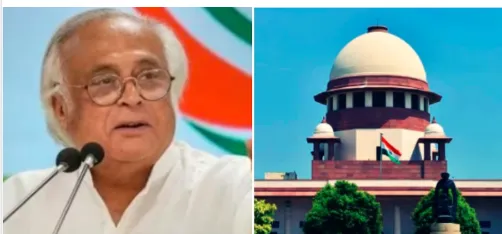

New Delhi, September 15: The Congress party has welcomed the Supreme Court’s recent ruling halting key provisions of the Waqf (Amendment) Act, calling it a victory for the core constitutional principles of justice, equality, and fraternity. The party expressed that the order is a significant step in reversing the "mischievous intentions" behind the original legislation.
Congress General Secretary in charge of communications, Jairam Ramesh, praised the Supreme Court’s decision, stating that it marked a notable win not just for those opposing the arbitrary law in Parliament, but also for the members of the Joint Parliamentary Committee who had raised dissenting opinions, which were previously ignored but are now vindicated.
“The Supreme Court’s order on the Waqf (Amendment) Act 2025 is a major victory, particularly for those who opposed this law in Parliament. It serves to undo the harmful intent embedded in the original statute,” Ramesh said on social media platform X.
Opposition legal teams had argued that the law would create a scenario where any individual could challenge the status of a Waqf property before a Collector, causing uncertainty about the property’s status while such litigation is ongoing. Ramesh also highlighted that the provision requiring a person to be a practising Muslim for at least five years to contribute to a Waqf was another problematic clause.
"The original intent behind these provisions was clear—to inflame voter sentiment and establish an administrative structure that could be used to foster religious disputes," Ramesh claimed.
The Supreme Court’s ruling includes several crucial interventions: staying the powers of the Collector, safeguarding existing Waqf properties from questionable challenges, and halting the requirement for proof of five years of Muslim practice until the relevant rules are formulated.
“We see this ruling as a win for the fundamental constitutional values of justice, equality, and fraternity,” Ramesh added.
The Supreme Court, however, did not stay the entire Waqf (Amendment) Act. In its interim order, the court put on hold key provisions of the law, including the clause that restricts Waqf donations to Muslims who have practiced Islam for the last five years. Despite this, the bench emphasized that the presumption remains in favor of the statute's constitutionality, and full arguments on the law’s validity will be heard at a later date.
A bench consisting of Chief Justice B R Gavai and Justice Augustine George Masih ruled on the matter, noting that while some sections of the Act needed immediate protection, the overall statute could not be entirely stayed at this point.
The court also addressed the contentious issue of non-Muslim participation in Waqf Boards, stating that the Central Waqf Council should have no more than four non-Muslim members out of 20, and state-level Waqf Boards should have no more than three non-Muslims out of 11.
The bench clarified that its directions were interim in nature and were meant to offer temporary relief until the final hearing on the constitutional validity of the Act.
The specific provisions temporarily stayed by the court include the rule requiring a person to be a practising Muslim for five years before dedicating a property as Waqf (Section 3(r)) and Section 3C, which granted government officers the authority to determine the status of Waqf properties.
The Waqf (Amendment) Bill, 2025 received presidential assent on April 5, 2025, and was passed by both the Lok Sabha and the Rajya Sabha in early April of the same year.